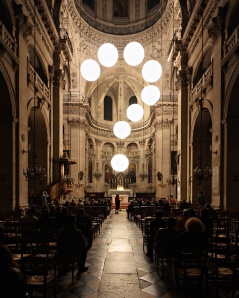
There have been plenty of things I’ve heard since I left Christian fundamentalism after spending 14 years (more than half my life) in it, and most of them make me want to tear my hair out. So, I put out a general call for some of the gems you have heard, and here’s a few that I got back.
1. “You just need to work through your bitterness.”– Teryn
Bitterness. It’s a good idea to pretty much never use that word in particular. Bitterness, in fundie-speak, is a tool to silence anyone who is being critical. If you’re accused of “bitterness,” it means that you are incapable of viewing any situation or person “correctly,” that you lack the capacity for love and grace, and what you actually need to work on is yourself. You’re imagining things, nothing bad is happening, and you have a screw loose. This is actually a form of gaslighting– convincing the person who’s being attacked that they’re just crazy– and we’ve been beaten over the head with it for years. Just because we’re saying things about the Church that aren’t pleasant doesn’t make us bitter. Just because we sound angry doesn’t mean we’re bitter.
2. “Don’t throw the baby out with the bathwater.” — Lydia
There are a lot of variations on this one, but it all boils down to this idea that Christianity is fine, it’s really just our personal experiences that we have to get over. And, I get why this one comes up a lot. For Christians who haven’t experienced either a) fundamentalism or b) spiritual abuse, their religion is one of the best, most wonderful, spectacular things in their life and they couldn’t imagine living without it. For us, though? It’s not even remotely the same feeling. When Christianity has been the weapon used to beat you, sometimes, throwing the whole thing out is the only healthy thing left to do.
3. “You were never really a Christian.” — Libby Anne
It’s the teachings of “eternal security” and “by their fruits you shall know them” taken one step too far. And, frankly, it’s codswallop. By any measure, people who grew up in Christian fundamentalism, prayed the sinner’s prayer, loved God, loved Jesus . . . they were Christians any way you look at it. Just because they’re not Christians now has absolutely zero bearing on if they were Christians then. The same thing goes if they don’t fit your particular criteria for what you think a “Christian” is.
4. “If you’re not currently attending a church, you have walked away from God.” — KR Taylor
People usually come to me armed with Hebrews 10:25 — “forsake not the assembling of yourselves together,” which is really just code for “real Christians go to church.” Which, seriously, asking some of us to go back to church is like asking a soldier with severe PTSD to go back to the battlefield, or asking a battered wife to go back to her abusive husband. You’re telling us that the only way we can be a “True Christian” is if we go to a building where all the other “True Christians” are once a week, and aside from sounding ridiculous, it’s inconsiderate and displays an astounding lack of compassion. If you’re telling someone who you know has been spiritually abused to get their ass back in church, all it means is that you haven’t been actually listening to us. If you were listening, you’d know exactly how hurtful and dismissive you sound.
5. “You need to work this out with trembling and fear.” — Dani
Also known as, “Are you sure you want to be asking these questions?” Questions, in many arenas of Christianity, make a lot of us uncomfortable. The unfortunate thing that I’ve encountered the most is that I grew up understanding more about the God of the Old Testament than a lot of “typical” Christians I’ve encountered since getting outside of fundamentalism. Questions like “is God really a genocidal megalomaniac?” or “How is it fair or loving to hold millions of people accountable for something they’ve never heard of?” are legitimate, but they’re also not easy. As fundamentalists, we tend to be intimately familiar with an angry, jealous, righteous God, and trying to figure out how that’s the same Person that is also supposed to be Love is hard. Beyond hard, at times. It’s downright impossible for many of us.
6. “I wish people just knew that if they remembered how good Jesus’ love for us is, these things wouldn’t seem so hard!” — Hännah
This one feels . . . empty. I’m super happy for all those people who have had amazing experiences with Jesus in their religion, but how good God or Jesus is doesn’t really change the fact that a lot of people’s lives are hell holes or that a lot of people who claim Jesus’ name have done some heinously evil things. And telling us just to ignore our “hardships” because “Jesus loves you!” is basically meaningless. It’s like splashing orange juice on a bullet wound. Sure, orange juice is awesome, and Vitamin C is good for you, but it’s not going to do anything to help.
7. “Why do you have to criticize the Church? Do you hate Christians?” — Boze
Probably more than a lot of these, this one makes me want to tear my hair out and beat my head against the wall. I think this is another example of the Christian persecution complex gone crazy. There’s this perception that Christianity is under constant, brutal attack on all fronts, and it’s a battle we’re all gloriously and nobly fighting, but it’s going to overwhelm us at some point and then everything will be terrible. This results in any form of criticism whatsoever being perceived as an “attack.” If what we have to say about the Church isn’t all happy-happy-joy-joy, then we should just stay quiet because we’re just making Christianity look bad. To ex-fundamentalists, this is a line we’re more than familiar with. Defending the reputation of the organization at the cost of actual people is a line we know by heart.
8. Quoting Jeremiah 29:11. Or Romans 8:28. Or pretty much any hand-picked verse about God working everything out. — Abi
Proof-texting. If there’s one thing that a lot of Christians, but fundamentalists in particular, are exceedingly good at, it’s this. Most of the pastors and preachers I’ve heard are the Kings of Taking Verses out of Context and Making it Sound Good. First of all, using verses like Jeremiah 29:11 (“I know the plans I have for you”) is bad hermeneutics. Also, throwing single verses at us isn’t very helpful, and is really just frustrating. When Bible verses enter the conversation like this, it usually means that whoever we’re talking to is done listening, and they’ve decided the most helpful thing they can do is use a trite cliché we’ve heard exactly 164,455,795 times before.
9. “You’re hurting the church. We need unity, not division.”
If I had a nickle.
It’s related to the “do you hate Christians?” comment, but this one is specifically an order to shut up and color. Criticisms of Christianity are not sowing division, just to be clear. There are all kinds of things that sow division– like telling the people in Moore, OK that they should be grateful that God deigned to destroy their homes, or covering up child molestation by pastors in your churches for over 30 years– but standing up for the broken isn’t one of them.
10. “I’m a/my church is fundamentalist, and I’m/we’re not anything like what you’re describing.”
I run into this sentiment a lot. In fact, when I put out my request for this on twitter, one of the people who responded said “I’m a fundamentalist. Please don’t throw stones.” Which, was just . . . ironically funny, but also made me sigh. I use the words fundamentalist and fundamentalism to talk about a specific Christian movement, and I use the accepted term to describe it. I know a lot of people who claim the label “fundamentalist”– in fact, one of my best and dearest friends does– who don’t actually fit. There is a difference between traditionalism, religious conservatism, and adhering to “fundamentals,” which is really just Protestant orthodoxy, and fundamentalism. I’m using the term as it is modernly defined.
However, there are a lot of people who are fundamentalist and fit exactly what I’m describing, and still say this. Which, just . . . boggles.
11. “If you are truly seeking God in this time, he will lead you to the Truth.” — Trischa
And if I’m led to believing in universalism? Or atheism? Or neo-paganism? Somehow, I don’t think they’ll believe me, because “Truth” usually means “whatever I think the Bible says.” The catch in this statement is “If you are truly seeking.” And they get to determine what “truly seeking” entails. If I don’t eventually end up agreeing with them, welp, I must not have been truly seeking!
12. “Fundamentalism isn’t really Christianity.”
Oh, boy. I get this one so much, and I’m never entirely sure how to respond to it, because damn. What do they think Christianity is then? It’s a pretty big religion, and it’s got an awful lot of denominations. If believing that Jesus is God, literally came to earth, was crucified and resurrected and now sits on the right hand of the father, and he did all of this to save us from our sins doesn’t qualify you for Christianity, I’d like to see what does. Fundamentalism is an especially pernicious sub-culture in Christianity, but it’s not something totally different. They believe a lot of the exact same stuff that most Christians do– which was a huge shock when I eventually figured that one out. But, they take the hard-edged stance that they’re the only true Christians. So, it’s always funny to me when a non-fundamentalist says the exact same thing a fundamentalist would say about them.
13. “Be careful you don’t lose your faith.” — Hännah
People are genuinely concerned about us, and just want to make sure that we’re ok. However, the concept that we could be “ok” without religion, without Christianity– it’s a little bit too far outside the box for a lot of Christians. To a lot of the people I know, living without their faith would be pretty unthinkable. Thoughts like “I don’t know how people survive without Jesus” (which is a modern remix of “you can do all things through Christ”) are pretty common among Christians– and they mean it. To be honest, I’ve said that sort of thing on more than one occasion. But, let me assure you: we are just fine. For a lot of us, “losing our faith” was the best– and hardest– thing that ever happened to us.
14. “I’ll pray for you.” — Lana
And what they mean by this is “I hope God shows you exactly how wrong you are soon!” (Thanks to Angela). Also, please avoid this one. If there’s a more empty, meaningless phrase in all of Christianity, I’d like to hear it, because I’m pretty sure it doesn’t exist. When someone says something like this, what most recovering fundies hear is “I don’t care about your problems, I want to exit this conversation, and please don’t even mention the fact that you’ve had a bad experience to me ever again.”
15. “Your critiques of Christianity aren’t valid, because you’re just confusing it with your fundamentalist background.”
And, for me, this is the one that makes me want to rage-stomp. Because yes, my background was pretty bad. Yes, the church I grew up in was pretty crazy. Yes, the easiest way I have of describing my experience is by calling the whole thing a cult.
However, fundamentalism is really just a microcosm of Christianity in general. It’s not that there’s anything about fundamentalism that is super off-the-radar crazy that makes it obviously bad. All it is, really, is a concentrated version of Christianity. Think of every single thing you’ve ever run into at your completely normal, run-of-the-mill Protestant churches, and I guarantee you that you’ll find it in a fundamentalist church. They’re not different, really, they’re just intensified. Because of that, my background makes me more qualified to speak about some issues, because I have more experience with more aspects of it than your typical church-goer. I actually know what some of these teachings do when they’re consistently enforced.
~~~~~~~~~~~~~~~~~~~~
And . . . that wraps it up for me. What about you? What are some things you’ve heard that just make you go crazy?
UPDATE: I’ve written two follow-up posts. One is on the things you should say, and the other explains more about fundamentalism as a sub-set of Christianity.















